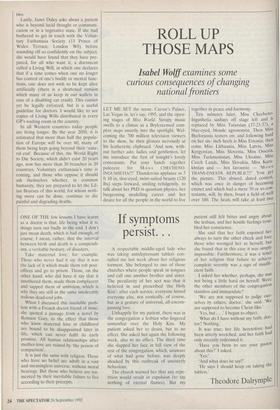If symptoms
persist.. .
ONE OF THE few lessons I have learnt as a doctor is that, life being what it is, things turn out badly in the end. I don't just mean death, which is bad enough, of course; I mean, rather, that the interval between birth and death is a compendi- um, a veritable bestiary, of disasters.
Take maternal love, for example. Those who never had it say that it was the lack of it which made them rob post- offices and go to prison. Those, on the other hand, who did have it say that it smothered them, made them complacent and sapped them of ambition, which is why they are still in the same intolerably tedious dead-end jobs.
When I discussed this insoluble prob- lem with a French doctor friend of mine, she quoted a passage from a novel by Romain Gary, to the effect that those who knew maternal love in childhood are bound to be disappointed later in life, which can never fulfil its early promise. All human relationships after mother-love are ruined by 'the poison of comparison'.
It is just the same with religion. Those who have no belief are adrift in a vast and meaningless universe, without moral bearings. But those who believe are tor- mented by their inevitable failure to live according to their precepts. A respectable middle-aged lady who was taking antidepressant tablets con- sulted me last week about her religious torment. She belonged to one of those churches where people speak in tongues and call one another brother and sister. The peculiarity of her sect was that it believed in and prescribed 'the Holy Kiss': after each service, everyone kissed everyone else, not erotically, of course, but as a gesture of universal, all-encom- passing love.
Unhappily for my patient, there was in the congregation a lesbian who lingered somewhat over the Holy Kiss. My patient asked her to desist, but to no effect. She asked her again the following week, also to no effect. The third time she slapped her face in full view of the rest of the congregation, which, unaware of what had gone before, was deeply shocked by this outbreak of unsisterly behaviour.
The church warned her that any repe- tition would result in expulsion (to say nothing of eternal flames). But my patient still felt bitter and angry about the lesbian, and her hostile feelings trot bled her conscience.
She said that her faith enjoined her always to turn the other cheek and love those who wronged her as herself, but she found that in this case it was simply impossible. Furthermore, it was a tenet of her religion that failure to achieve complete serenity was a sign of insuffi- cient faith.
I asked her whether, perhaps, she was not being a little hard on herself. Were the other members of the congregation stainless and immaculate?
`We are not supposed to judge our- selves by others, doctor,' she said. 'We are supposed to become Christ-like.'
`Yes, but . . I began to object. `What do I have without my faith, doc- tor? Nothing.' It was true: her life heretofore had been utterly wretched, and her faith had only recently redeemed it. 'Have you been to see your pastor about this?' I asked.
`Yes.'
`And what does he say?' `He says I should keep on taking the tablets.'
Theodore Dalrymple


































































 Previous page
Previous page